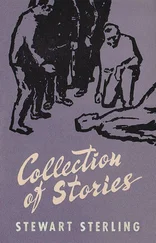“Just my husband.”
“When you said good night, was it understood you weren’t to see him in the morning? Did he say anything about leaving in the small hours of the night?”
That was a bad hurdle to get over. “It was left indefinite,” she said. “We’re... we’re sort of casual out here about those things — formal good-byes and such.”
“Even so, as his hostess, wouldn’t it be up to him to at least drop some hint to let you know he was going, to thank you for your hospitality before taking his leave?”
She brought a gleam of her old prom-girl manner, of three or four years before, to the surface. Keep it light and off dangerous ground. It had worked to ward off boa-constrictor hugs; maybe it would work to keep your husband out of difficulties with the police. “You’ve read your Emily Post, I see. Won’t you have a drink while you’re doing this?”
He flattened her pitiful attempt like a locomotive running on a single track full steam ahead. “No, I won’t! Did he drop the slightest remark to indicate that he wouldn’t be here by the time you were up the following morning?”
He’d given her an opening there: her own and Gil’s habitual late hour for rising any day in the week. “Well, we took that for granted. After all, he had to be back at the office by nine and—”
But it didn’t work out so good. “But he didn’t have to take the milk train to get back to the office by nine. Isn’t it a little unusual that he should leave in the dead of night like that, a man of sixty-four, without getting his night’s rest first?”
“Well, all right. Say it is!” she flared resentfully. “But we’re not accountable for his eccentricities, why come to us about it? He left here, I assure you. Look under the carpet if you don’t think so!” A second later she wished she hadn’t said that; it seemed to put her ahead of him, so to speak. They got you all muddled, these professional detectives. Just think if it had been a case of out-and-out murder, instead of just trying to conceal that money business of Gil’s!
Ward smiled wryly at her dig about the carpet. “Oh, I don’t doubt he left the house, here.”
She didn’t like the slight emphasis he gave the word “house,” as though implying something had happened to him right outside it, or not far away.
“Then what more have we got to do with it? Who’s putting these ideas in your head, his wife?”
“I don’t have ideas in my head, just instructions, Mrs. Blaine.”
“Why don’t you check at the other end, in the city? Why don’t you find out what became of him there?”
He said very quietly, “Because he never got there, Mrs. Blaine.”
Womanlike, she kept trying to retain the offensive, as the best defense. “How do you know for sure? Just because he didn’t appear either at his home or his office? He may have been run over by a taxi. He may have been overcome by amnesia.”
“To get to the city, he would have had to take the train first of all, wouldn’t he, Mrs. Blaine? A man of sixty-four isn’t likely to thumb a ride in along the highway at four in the morning, with week-end baggage in the bargain, is he?”
“He did take the train. He must have. My husb—”
“We happen to know he didn’t. We’ve questioned the conductor on that train whose business it is to punch the passengers’ tickets as they get on at each successive stop. No one got on the 4:20 train at all at your particular station out here. And that milk train is empty enough to make it easy to keep track. The ticket agent didn’t sell anyone a ticket between the hours of one and six thirty that morning, and since you drove him out in the car yourself on Friday afternoon, it isn’t likely he had the second half of a round-trip ticket in his possession; he would have had to buy a one-way one.”
A cold chill ran down her spine; she tried not to be aware of it. “All I can say is, my husband drove him to the station and then came on back without watching him board the train. He may have strolled a little too far to the end of the platform while waiting and been waylaid by a footpad in the dark.”
“Yes,” he said reasonably enough. “But why should the footpad carry him off bodily with him into thin air? We’ve searched the immediate vicinity of the station pretty thoroughly, and now we’re combing over the woods and fields along the way. His baggage has disappeared, too. How many pieces did he bring with him, Mrs. Blaine?”
That one was a son of a gun. Would it be better to say one and try to cover up the presence of the one he’d left behind? Suppose it came out later that he’d brought two — as it was bound to — and they identified the second one, upstairs, as his? On the other hand, if she admitted that he’d left one behind, wouldn’t that only add to the strange circumstances surrounding his departure? She couldn’t afford to pile that additional strangeness on top of the already overwhelming strangeness of the hour at which he’d gone; it made it look too bad for them, too much as though his leave-taking had been impromptu, conditioned by anger or a quarrel. And then in the wake of that would unfailingly come revelation of Gil’s misdeed in regard to the check.
She took the plunge, answered the detective’s question with a deliberate but not unqualified falsehood, after all this had gone through her mind. “I believe... one.”
“You can’t say for sure? You brought him out in the car with you, Mrs. Blaine.”
“I’ve brought so many people out in the car. Sometimes I dream I’m a station-wagon driver.”
Then, just as she felt she couldn’t stand another minute of this cat-and-mouse play, just as she could feel the makings of a three-alarm scream gathering in her system, she recognized the sound of their own car outside and Gil was back at last. He sounded the horn once, briefly, as in a sort of questioning signal.
“Here’s my husband now,” she said, and jumped up and ran to the door before he could stop her.
“Hello, Gil,” she said loudly. She wound an arm around his neck, kissed him on the side of the face, back toward the ear — or seemed to. “There’s a detective in there,” she breathed.
His own breath answered hers: “Wait a minute; stay like this, up against me.” He said loudly down the back of her neck: “Hello, beautiful. Miss me?”
She could feel his hand fumbling between their bodies. He thrust something into her disengaged hand, the one that wasn’t clasping the nape of his neck. Spongy paper, currency. “Better get rid of this. I don’t think he’ll search me, but bury it in your stocking or somewhere, till he goes.” And then in a full-bodied voice: “Any calls for me?”
“No, but there’s a gentleman inside waiting to see you now.”
And under cover of that he’d gone on: “Go out and get in the car; take it away. Go down the village and... buy things. Anything. Keep buying, keep buying. Stay out. Phone here before you come back. Phone here first.”
Then they had to break it up; they’d gotten away with m — Not that word! They’d gotten away with a lot, as it was.
She followed Gil’s instructions now, but she did it her way. She couldn’t fathom the motivation. But she couldn’t just walk out the door, get in, and drive off; that would have been a dead give-away he’d cued her. She did it her way; it only took a minute longer. She went back into the living room after him, across it just to the opposite doorway, and called through to Leona in a war whoop: “Leona, need anything?” She didn’t have to worry about getting the wrong answer; she knew how they’d be fixed.
“Sure do,” said the uninhibited Leona, “all we got lef’ after that bunch of cannibals is a lot of nothin’!”
Читать дальше












